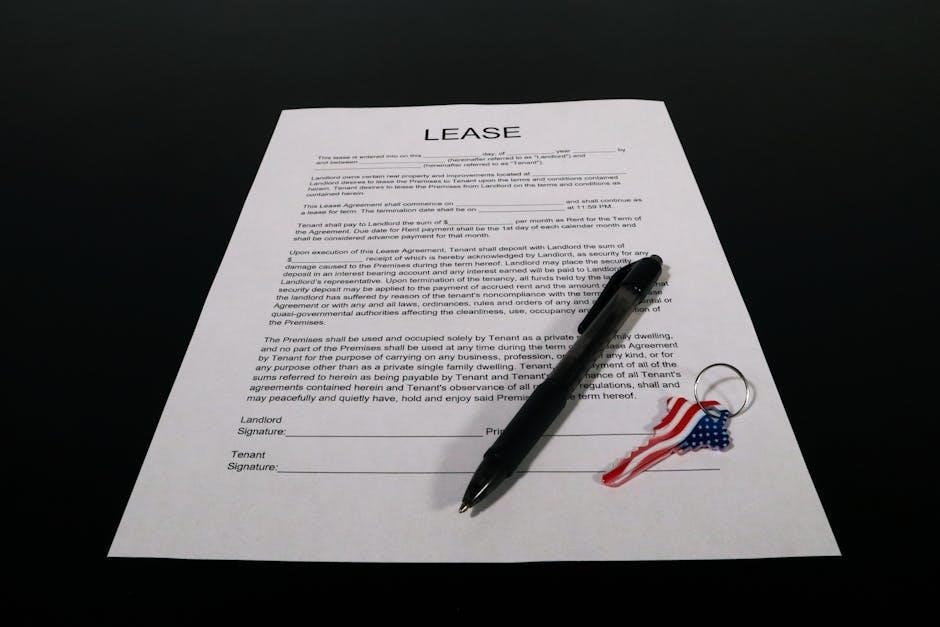massachusetts rental lease agreement pdf
Category : PDF
A Massachusetts Rental Lease Agreement outlines the terms for renting residential or commercial property, ensuring clarity on responsibilities and rent. It’s a legally binding document between landlord and tenant, detailing property use, payment terms, and lease duration. Having a written lease is crucial for both parties to avoid disputes and ensure compliance with Massachusetts rental laws. A PDF template provides a structured format for creating a comprehensive and enforceable agreement.
1.1 Overview of the Lease Agreement
A Massachusetts Rental Lease Agreement is a legal contract outlining the terms and conditions for renting property. It defines the relationship between the landlord and tenant, specifying rent, lease duration, and property use. This document ensures both parties understand their responsibilities and rights, preventing potential disputes. The lease agreement is legally binding and customizable, covering details like payment terms, security deposits, and property maintenance. Whether for residential or commercial use, a clear lease agreement is essential for a smooth rental experience in Massachusetts.
1.2 Importance of a Written Lease in Massachusetts
A written lease agreement is essential in Massachusetts to establish clear expectations and protect both landlords and tenants. It outlines rent, responsibilities, and lease terms, reducing the risk of disputes. Massachusetts law requires specific disclosures, and a written lease ensures compliance. Without it, resolving conflicts can be challenging and legally complex. A written lease provides a formal record of the agreement, protecting both parties’ rights and promoting a professional rental relationship. It’s a crucial step for legally binding and hassle-free renting in Massachusetts.

Key Components of a Massachusetts Lease Agreement
A Massachusetts lease agreement includes essential elements like parties involved, property details, lease term, rent, security deposit, and responsibilities. It ensures clarity and compliance with state laws.
2.1 Parties Involved: Landlord and Tenant Information
The Massachusetts lease agreement must clearly identify both the landlord and tenant. Full names, addresses, and contact information are typically included. The landlord is the property owner, while the tenant is the renter. This section ensures both parties are accountable and aware of their roles. Accurate details are crucial for legal enforceability and clarity. Proper identification helps prevent disputes and ensures smooth communication throughout the lease term.
2.2 Property Description and Lease Term Details
The lease agreement provides a detailed description of the rental property, including its address, type, and specific features. It outlines the lease term, specifying the start and end dates, whether it’s fixed-term or month-to-month, and any renewal or termination clauses. This section ensures both parties are clear about the property’s use and the duration of the agreement. Accurate property details and lease terms are essential for establishing a legally binding contract and avoiding future disputes.

Massachusetts-Specific Lease Laws
Massachusetts lease laws regulate security deposits, rent increases, and mandatory disclosures, ensuring tenant protections and clear guidelines for landlords. These laws are enforceable and must be followed.
3.1 Security Deposit Regulations
In Massachusetts, security deposits are capped at one month’s rent and must be held in a separate, interest-bearing account. Deductions from the deposit are limited to unpaid rent, utilities, or damages beyond normal wear and tear. Landlords must provide an itemized list of deductions and return the remaining deposit within 30 days after the tenancy ends. Failure to comply with these regulations can result in legal consequences for landlords. Proper documentation is essential to ensure both parties are protected under Massachusetts law.
3.2 Rent Increase and Payment Terms
In Massachusetts, rent increases must be provided in writing, and landlords cannot raise rent during a fixed-term lease. Payment terms typically outline due dates, accepted methods, and late fees. Tenants generally have a grace period before late charges apply, usually five days. Massachusetts law prohibits unfair rental practices, such as excessive rent increases without proper notice. Clear payment terms and rent adjustment clauses ensure transparency, protecting both landlords and tenants under state rental laws.

Security Deposit Guidelines
Massachusetts security deposit guidelines dictate that landlords can charge up to one month’s rent. Payment methods and a written receipt are typically required for clarity and compliance.
4.1 Maximum Amount and Payment Methods
In Massachusetts, the maximum security deposit allowed is one month’s rent. Landlords must provide a written receipt upon receiving the deposit, including the amount, date, and property address; Payment methods typically include checks or money orders for documentation purposes. Cash payments are permissible but less common due to the lack of a paper trail. A clear record of the transaction ensures both parties maintain accountability and transparency, adhering to state regulations for security deposits.
4.2 Deductions and Return Procedures
In Massachusetts, landlords must return security deposits within 30 days after the tenancy ends. Deductions are allowed for unpaid rent, utilities, and repair costs for damages beyond normal wear and tear. The landlord must provide an itemized list of deductions. If no deductions are made, the full deposit must be returned. Tenants are entitled to receive any remaining balance after lawful deductions. Proper documentation is essential to ensure compliance with state laws and avoid potential disputes over security deposit returns.

Lease Term and Rent Details
This section outlines the lease duration, whether fixed-term or month-to-month, and specifies rent payment terms, including due dates and accepted payment methods, ensuring clarity for both parties.
5.1 Fixed-Term vs. Month-to-Month Agreements
A fixed-term lease agreement in Massachusetts specifies a defined rental period, typically one year, with clear start and end dates; Month-to-month agreements, however, renew automatically and offer flexibility. Fixed-term leases provide stability for tenants and guaranteed income for landlords, while month-to-month agreements allow both parties to adjust terms or terminate with proper notice, usually 30 days. The choice depends on the landlord’s preferences and the tenant’s needs for flexibility or long-term stability.
5.2 Rent Calculation and Payment Options
Rent in Massachusetts is typically calculated based on the property’s value, amenities, or as a fixed amount agreed upon by both parties. Payment options may include online portals, checks, or money orders, depending on the landlord’s preference. The lease should outline the due date, acceptable payment methods, and any late fees. Landlords must provide receipts upon request and ensure compliance with state laws. Both parties should retain records of transactions for clarity and legal purposes, ensuring a smooth rental relationship.
Responsibilities and Obligations
A Massachusetts rental lease outlines the landlord’s duty to maintain habitable conditions and the tenant’s obligation to pay rent and preserve the property. Both parties must comply with lease terms and state laws, ensuring a mutually respectful and legally binding relationship.
6.1 Landlord Responsibilities
Landlords in Massachusetts must maintain the rental property in habitable condition, addressing necessary repairs and ensuring compliance with safety and health codes. They are responsible for providing functional plumbing, heating, and electrical systems. Landlords must also respect tenant privacy, adhering to proper notice requirements before entering the unit. Additionally, they must manage common areas, if applicable, and ensure the property meets state sanitation standards. These responsibilities are non-delegable and crucial for upholding tenant rights under Massachusetts law.
6.2 Tenant Responsibilities
Tenants in Massachusetts are required to pay rent on time, maintain the rental property, and comply with all terms of the lease agreement. They must keep the unit safe and sanitary, promptly report needed repairs, and refrain from illegal activities on the premises. Tenants are also responsible for obtaining required insurance and respecting noise ordinances. They must not alter the property without permission and must provide proper notice before vacating. Fulfilling these obligations ensures a positive tenancy and protects the tenant’s rights under Massachusetts rental laws.

Creating and Executing the Lease Agreement
Creating a Massachusetts lease involves drafting a clear, comprehensive document that outlines all terms, ensuring legal compliance. Both parties must review, sign, and date the agreement, with options for e-signatures, making it a legally binding contract.
7.1 Steps to Draft the Lease Agreement
Drafting a Massachusetts lease agreement involves identifying the parties, property details, and lease terms. Include rent, security deposit, and payment terms. Outline tenant and landlord responsibilities, lease duration, and renewal options. Add clauses for repairs, pets, and subletting. Ensure compliance with Massachusetts laws, such as security deposit regulations. Attach necessary disclosures, like lead paint notices. Review and finalize the document, ensuring all terms are clear and legally binding. Both parties must sign and date the agreement, with options for e-signatures for convenience and efficiency.
7.2 E-Signatures and Digital Execution
E-signatures simplify the lease agreement process in Massachusetts, offering convenience and efficiency. Both landlords and tenants can sign digitally, eliminating the need for in-person meetings. Digital execution ensures documents are legally binding and securely stored. Platforms like LeaseRunners provide e-signature tools, enabling quick and seamless execution. This method reduces errors, accelerates the process, and maintains compliance with Massachusetts laws. Tenants and landlords can access the agreement anytime, ensuring transparency and organization. Digital signatures enhance security, with encrypted storage protecting sensitive information.

Legal Compliance and Required Disclosures
A Massachusetts lease must comply with state laws, including mandatory disclosures, to ensure legal enforceability and protect both landlords and tenants from potential disputes.
8.1 Mandatory Disclosures in Massachusetts
In Massachusetts, landlords must include specific disclosures in the lease agreement to ensure compliance with state laws. These disclosures include information about lead paint hazards, security deposit terms, and the landlord’s responsibilities under the Massachusetts Sanitary Code. Additionally, landlords must disclose any known defects in the property that could affect the tenant’s health or safety. Failure to provide these mandatory disclosures can result in legal consequences for the landlord, including potential fines or the inability to enforce certain terms of the lease.
8.2 Ensuring Lease Compliance with State Laws
Ensuring compliance with Massachusetts state laws is crucial when drafting a rental lease agreement. Landlords must adhere to regulations regarding security deposits, rent increases, and eviction procedures. The lease must include clauses that align with state-specific rules, such as limits on rent increases and requirements for proper notice periods. Additionally, landlords must comply with the Massachusetts Sanitary Code, ensuring the property meets health and safety standards. Using a compliant lease template and staying informed about updates to rental laws helps maintain adherence to state regulations and avoids legal disputes.
A Massachusetts Rental Lease Agreement is a foundational document ensuring clarity and legal compliance. Using a PDF template guarantees both landlords and tenants a smooth, binding arrangement.
9.1 Final Thoughts on Massachusetts Lease Agreements
A Massachusetts Rental Lease Agreement is a vital document that ensures clarity, legal compliance, and a smooth rental experience for both landlords and tenants. By outlining terms such as rent, property use, and responsibilities, it prevents disputes and provides a clear framework for resolving issues. Using a PDF template guarantees a professional and enforceable agreement. Both parties should carefully review the lease to ensure all details align with their needs and Massachusetts state laws. This structured approach fosters a balanced and mutually beneficial rental relationship.
